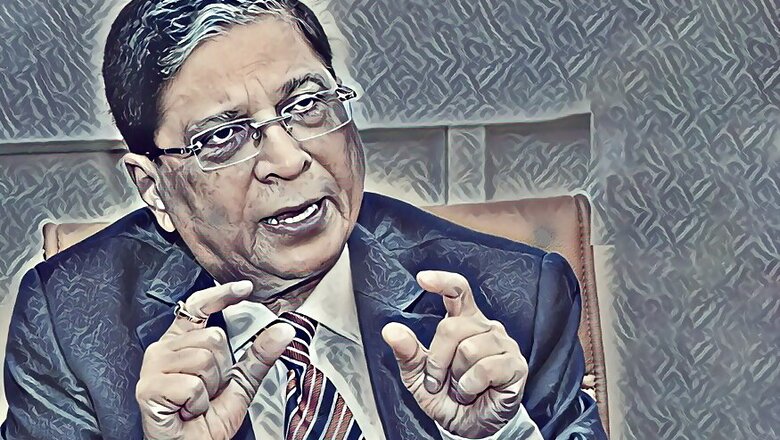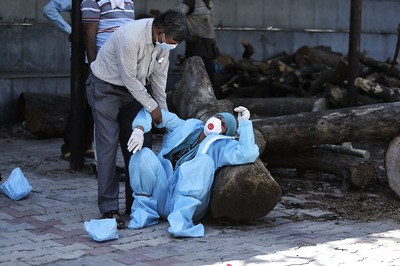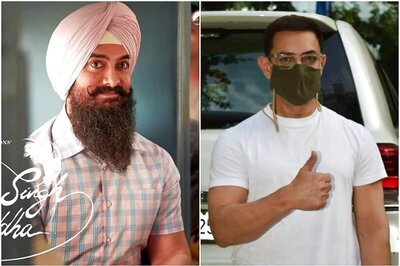
views
New Delhi: Yet Brutus says he was ambitious; and Brutus is an honourable man — Julius Caesar
A little more than kin, and less than kind — Hamlet
William Shakespeare has always been one of the prevailing masters of irony.
Incidentally, this English poet and playwright was one name often quoted by outgoing Chief Justice of India Dipak Misra, whose tenure seems to have become yet another classic illustration of irony.
A judge, who was extremely circumspect in holding on his public image, had his most difficult battle in fighting negative perceptions and views for his entire stint at the helm. A judge, who rarely raised his voice inside the court, was given to fight the clamour raised by his brethren in full public view.
Justice Dipak Misra's tenure as the CJI has been marked by unparalleled controversies in India’s legal history. And yet, his would be one name that has created a history of its own kind with ground-breaking body of judgments.
The tumultuous tenure of Justice Misra was replete with its highs and lows, making his journey in the Supreme Court one that would be remembered for a very long time.
He took over as the head of the institution in August last year, bereft of any dispute — it was a natural succession being the most senior judge.
Soon after taking over, Justice Misra struck the right chord by making recommendations of the Collegium public. All proposals to the government were uploaded on the court website, following a resolution of the five most senior judges that it would go a long way in ushering in more transparency in matters of judicial appointments.
But the CJI's court did not look like the first court of the country with a massive crowd of lawyers, litigants and media personnel cramming it due to sheer number of cases being listed. And one category of these cases were about to become the alarm bells.
Justice Misra had carried over medical admission cases from court number 2 to court number 1. One fine day, the controversy broke out if his orders in a medical admission case perpetuated corruption.
This followed unsavoury court proceedings in the first two courts of the country. A battle of perception spanned between the CJI and Justice J Chelameswar while the legal fraternity remained divided over the issues of propriety, maturity and fairness shown by the two judges.
Some called Justice Chelameswar's orders as reflective of his frustration and ambitions of losing out to Justice Misra in becoming the CJI because of delayed elevation.
Some others remained critical of Justice Misra's ways of asserting and assuming supremacy by throwing to wind the cardinal principle that nobody would be a judge in his own cause. He was even accused of using certain Supreme Court lawyers in achieving his ends.
Be as it may, the institution had received a jolt and lawyers had chosen their sides. But the firestorm was still to come.
January 12 was the biggest shock when the four most senior judges, sitting at the lawn of Justice Chelameswar's residence, held a press briefing and attacked Justice Misra over allocation of important cases and overall administration of the apex court.
The country had never seen its Supreme Court judges addressing a press conference to show loss of confidence in their chief — a phenomenon prevalent in politics and absolutely absent in judiciary.
The fire was raging and India's top judicial post, presided over by Justice Misra, was engulfed in this blaze. But he maintained a stoic silence.
There were no answers, no explanations, nor any statement from Justice Misra even after the press briefing was followed by leaking of the confidential letters written by these judges to the CJI. Every subsequent week, a new disceptation engaged Justice Misra but he was not the one to speak outside his court room.
When journalists surrounded him on the sidelines of any event, their questions were responded to by Justice Misra in other kind of questions or some literary comments on books and poems. It was difficult to fathom for anyone what he was thinking.
Then came the final straw. An impeachment motion was proposed against Justice Misra for his removal on allegations of misconduct.
It was first such occasion when a sitting CJI was being sought to be removed. The proposal was shot down by the Vice-President and it was challenged in the Supreme Court. The case was finally withdrawn. But Justice Misra's image had taken one more hit.
Amid all these conflicts, Justice Misra decided to focus on what he had complete control over — his court and its roster.
Justice Misra set up two Constitution Benches and headed them to finally hear and decide around ten cases of immense importance.
Everything about the first court changed overnight. Justice Misra's court became the centre-stage of seminal arguments on issues concerning civil liberties, rights and constitutional principles.
Senior lawyers were making impassioned arguments in Court No.1 while young advocates and law researchers were seen taking notes meticulously —who could say this court was in the eye of a storm until a few days back.
Between April and September, Justice Misra sat in different combinations to expedite adjudication of constitutional matters even as the blaring criticism started losing its sound and flash.
Last week, these benches led by Justice Misra delivered landmark verdicts on Aadhaar, adultery, Sabarimala, decriminalisation of politics etc.
Some of these verdicts broke new grounds while some others displayed exemplary restraint by judiciary and its endeavour to strike a right balance. Women rights, too, found a substantial voice in many of these judgments.
The end of his tenure was around the corner and CJI Misra was busy delivering important judgments back to back, evolving new jurisprudence in contemporary India and laying down judicial precedents for decades to come.
He also honoured the convention by recommending the most senior judge Ranjan Gogoi as his successor amid speculation if the judge, who was part of the press conference in January would be endorsed by Justice Misra.
The CJI seemed to tide over the distasteful episode and the crucial hearings in nationally important cases definitely came to his aid.
On Monday, Justice Misra met his brother and sister judges, lawyers as well as journalists for one last time in the Supreme Court precincts. And he spoke only about Shakespeare, William Blake, Eric Segal and Pablo Neruda.
Justice Misra said not a word about the contentious press conference, nor did he take any credit for delivering some big verdicts.
His last hurrah came on Monday evening when Justice Misra said that if he were to write an autobiography, it would be titled 'No Antonians'.
"No rhetoric but only hard work," concluded Justice Misra in the Supreme Court, while the jury is still out to pick positives and negatives from the spectrum of Justice Misra's unforgettable tenure as India's 45th CJI.




















Comments
0 comment